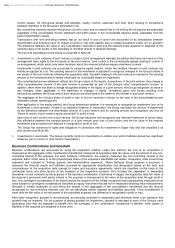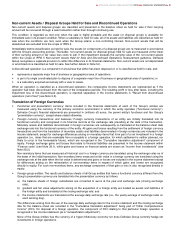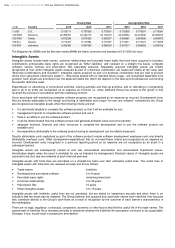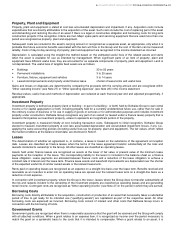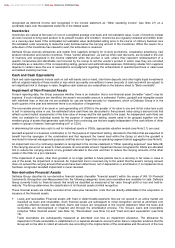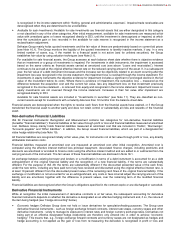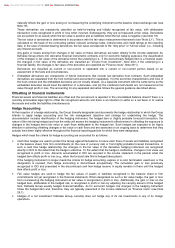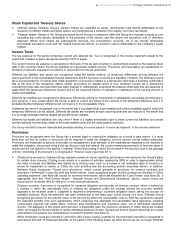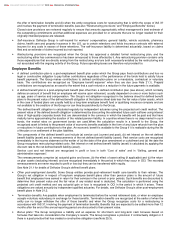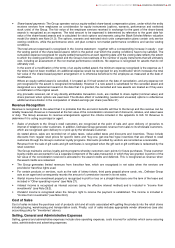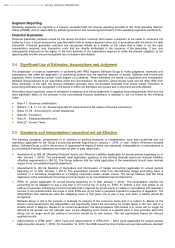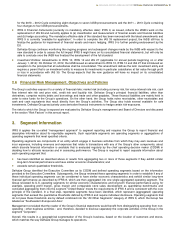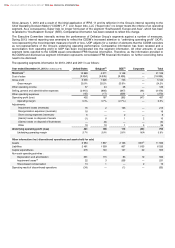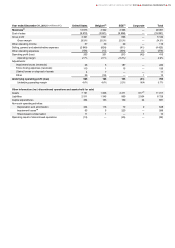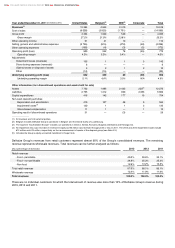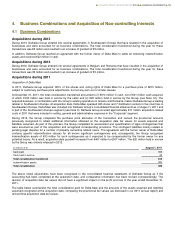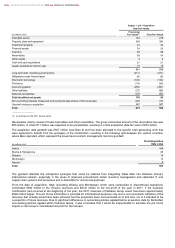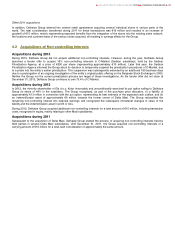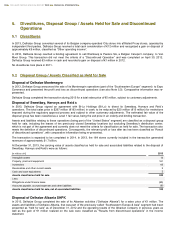Food Lion 2013 Annual Report Download - page 91
Download and view the complete annual report
Please find page 91 of the 2013 Food Lion annual report below. You can navigate through the pages in the report by either clicking on the pages listed below, or by using the keyword search tool below to find specific information within the annual report.
Share-based payments: The Group operates various equity-settled share-based compensation plans, under which the entity
receives services from employees as consideration for equity instruments (options, warrants, performance and restricted
stock units) of the Group. The fair value of the employee services received in exchange for the grant of the share-based
awards is recognized as an expense. The total amount to be expensed is determined by reference to the grant date fair
value of the share-based awards and is calculated for stock options and warrants using the Black-Scholes-Merton valuation
model (for details see Note 21.3). The options, warrants and restricted stock units compensation plans contain only service
vesting conditions, while the performance stock unit plan contains non-market performance conditions and service vesting
conditions.
The total amount expensed is recognized in the income statement - together with a corresponding increase in equity - over
the vesting period of the share-based award, which is the period over which the vesting conditions have to be satisfied. The
cumulative expense recognized for equity-settled transactions at each reporting date until the vesting date reflects the extent
to which the vesting period has expired and the Group’s best estimate of the number of equity instruments that will ultimately
vest, including an assessment of the non-market performance conditions. No expense is recognized for awards that do not
ultimately vest.
In the event of a modification of the terms of an equity-settled award, the minimum expense recognized is the expense as if
the terms had not been modified. An additional expense would be recognized for any modification which increases the total
fair value of the share-based payment arrangement or is otherwise beneficial to the employee as measured at the date of
modification.
Where an equity-settled award is cancelled, it is treated as if it had vested on the date of cancellation, and any expense not
yet recognized for the award is recognized immediately. However if a new award is substituted for the cancelled award and
designated as a replacement award on the date that it is granted, the cancelled and new awards are treated as if they were
a modification of the original award.
Any proceeds received, net of any directly attributable transaction costs, are credited to share capital (nominal value) and
share premium when options are exercised. The dilutive effect of outstanding (vested and unvested) options is reflected as
additional share dilution in the computation of diluted earnings per share (see Note 31).
Revenue Recognition
Revenue is recognized to the extent that it is probable that the economic benefits will flow to the Group and the revenue can be
reliably measured. Revenue is measured at the fair value of the consideration received net of discounts, rebates, and sales taxes
or duty. The Group assesses its revenue arrangements against the criteria included in the appendix to IAS 18 Revenue to
determine if it is acting as principal or agent.
Sales of products to the Group’s retail customers are recognized at the point of sale and upon delivery of groceries to
internet or telephone order customers. In addition, Delhaize Group generates revenue from sales to its wholesale customers,
which are recognized upon delivery to or pick-up by the wholesale customer.
As stated above, sales are recorded net of sales taxes, value-added taxes and discounts and incentives. These include
discounts from regular retail prices for specific items and “buy-one, get-one-free”-type incentives that are offered to retail
customers through the Group’s customer loyalty programs. Discounts provided by vendors are recorded as a receivable.
Revenue from the sale of gift cards and gift certificates is recognized when the gift card or gift certificate is redeemed by the
retail customer.
The Group maintains various loyalty points programs whereby customers earn points for future purchases. These customer
loyalty credits are accounted for as a separate component of the sales transaction in which they are granted. A portion of the
fair value of the consideration received is allocated to the award credits and deferred. This is recognized as revenue when
the award credits are redeemed.
The Group generates limited revenues from franchise fees, which are recognized in net sales when the services are
provided or franchise rights used.
For certain products or services, such as the sale of lottery tickets, third party prepaid phone cards, etc., Delhaize Group
acts as an agent and consequently records the amount of commission income in its net sales.
Rental income from investment property is recognized in profit or loss on a straight-line basis over the term of the lease and
included in “Other operating income” (see Note 27).
Interest Income is recognized as interest accrues (using the effective interest method) and is included in “Income from
investments” (see Note 29.2).
Dividend income is recognized when the Group’s right to receive the payment is established. The income is included in
“Income from investments” (see Note 29.2).
Cost of Sales
Cost of sales includes the purchase cost of products sold and all costs associated with getting the products into the retail stores
including buying, warehousing and transportation costs. Finally, cost of sales includes appropriate vendor allowances (see also
accounting policy for “Inventories” above).
Selling, General and Administrative Expenses
Selling, general and administrative expenses include store operating expenses, costs incurred for activities which serve securing
sales, administrative and advertising expenses.
DELHAIZE GROUP ANNUAL REPORT 2013 FINANCIAL STATEMENTS
89



